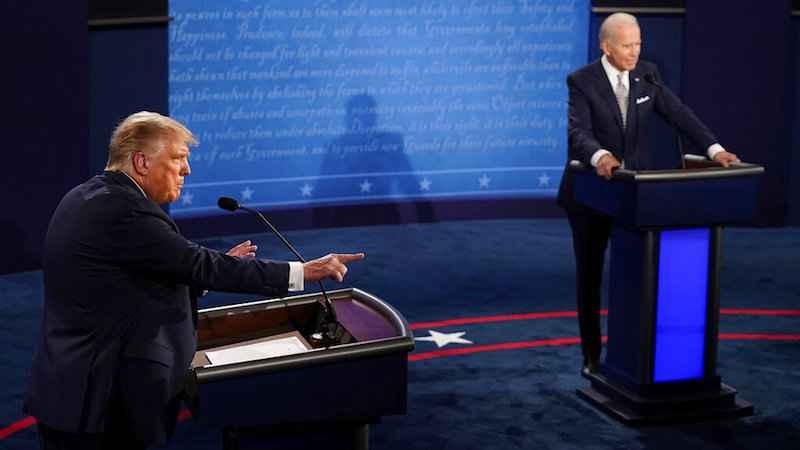BCA’s Thoughts on the First Presidential Debate
October 26, 2020
The first presidential debate was long-awaited by people on both sides of the political spectrum. It would be the first time that Vice President Joe Biden and President Trump would square off and give undecided voters a chance to understand both sides of the argument before making a choice in November. Whatever the expectations might have been before the debate, the result was definitely much worse than anyone could have imagined. Whether it was Donald Trump’s failure to address his stance on white supremacy, or the lack of good conversation due to constant interruptions, it is fair to say that many voters were only left more confused or isolated from politics as a result of the debate.
First, let’s discuss President Trump. Prior to the debate, Trump’s polls had been trailing Biden’s for the past few months. But this was the same situation that the country was in in 2016, when almost all polls concluded that Hilary Clinton was ahead overall and in key battleground states. According to RealClearPolitics, Biden had 49.3% polling averages as of September 18th, leading Trump by a little over 6 percentage points, much better than Hilary Clinton’s 1 point lead over Trump during the same time period in 2016. This makes it clear that Trump’s goal coming into the debate was to gain more support apart from his loyal base, especially with white suburban voters. White suburban voters helped him win in 2016, but have slowly been abandoning him as his presidency continued (especially women.) During the debate, Trump used his common tactic of preaching “law and order” as a jab at the Black Lives Matter protests that have taken place in many cities and suburbs since May. This is a continuation of previous policies that aimed to create racially charged fears in suburban voters, such as rescinding the Affirmatively Furthering Fair Housing (AFFH) plan that served to integrate many racially segregated suburban communities. He stated that this policy would allow these communities to retain higher home values as well as contribute to lowering crime rates. One of the most memorable moments of the debate was Trump’s avoidance of condemning white supremacists, stating “Proud boys stand by.” Proud Boys is a neo-fascist, white supremacist group, which clearly would not help his case with non-white voters. Trump apparently attempted to backtrack on his statement after the debate, stating that he did not even know who they were. Finally, it was impossible to watch the debate without noticing the amount of times that President Trump interrupted both Biden and Wallace (over 70 times)!
Next, Biden. Biden came into the debate with a much different strategy: attempting to appeal to Americans. Much of his speaking was done to the camera, almost as if he was speaking directly to viewers. Biden also did interrupt Trump, but to a lesser extent. Biden missed opportunities to clarify if he would add more judges to the Supreme Court if Amy Coney Barrett was to get approved. He also could have done a better job of pointing out the impact of Trump’s rallies on contributing to spikes (such as in Tulsa, Oklahoma.) However, Biden successfully aligned himself with the center of the political spectrum on issues such as healthcare, defunding the police, and the Green New Deal. This comes after the Trump campaign attempted to paint Biden as a far left candidate many times in ads as well as in the debate. Biden’s most memorable quote from the debate was: “Will you shut up, man?”
BCA students were pretty decisive in their thoughts on the debate. 53% of students stated that the debate made them feel disappointed, while 34% stated that they found it entertaining. Over 70% of students believed that none of the main topics of the debate (The Supreme Court, COVID-19, climate change, the economy, race and violence, and election integrity) were well-addressed during the debate. 42.5% of students had more favorable opinions about Biden after the debate, while 5.6% of students said the same for Trump. Interestingly, 80.1% of students surveyed believed that Biden won the debate. An anonymous BCA student stated, “I thought that the debate did not cover enough topics. Instead of focusing on issues from 2016-2020 the debate was centered only on topics that happened over the past couple of months. I feel this does not accurately display the qualifications of either candidate because they will have to deal with a bigger variety of issues while in office than what happened only in these few months. Also I did not like the fact that Trump disregarded the rules of the debate his campaign agreed that he would follow. I feel this ruined the debate and turned it into people speaking over each other and insulting each other rather than actually discussing the issues at hand and helping undecided voters decide who they want to vote for.” Another anonymous student stated, “The debate got disturbingly personal between the candidates for something that supposedly helps determine who will lead and represent America for the next four years. After the debate ended, I did not have the impression of having learned about each candidates’ policies nor goals. Rather, I learned more about their personal lives. This was mainly due to Trump’s tactics where he brought up Biden’s school grades, political history, and even his son Hunter Biden. Although I understand that this is probably to dissuade voters from supporting Biden, Trump focused on it too much (kept interrupting Chris Wallace), took it too far (interrupted Biden when he was talking about his dead son). I would rather say there was no clear winner. Trump was the clear instigator of how off-topic and irrelevant the debate became and Biden was unable to resist Trump’s tactics. I chose Biden because he at least attempted to speak to the American people by looking directly at the camera. And Trump was unable to say that he did not support Proud Boys, and instead said “Stand back, stand by.” This was widely interpreted, and not unjustly so, as him giving a message to his supporters to await further instructions if the outcome of the election does not please him.”
Overall, the debate did not help to clear up much of the political division that is present in America today. While this election cycle has already been unprecedented in many ways, due to the resurgence of the Black Lives Matter movement and the effect of the COVID-19 pandemic, the debate has proved that there is much more to come in the 4 weeks before the election. And it seems that the uncertainty will continue with the new news that President Trump has been infected by COVID-19.






